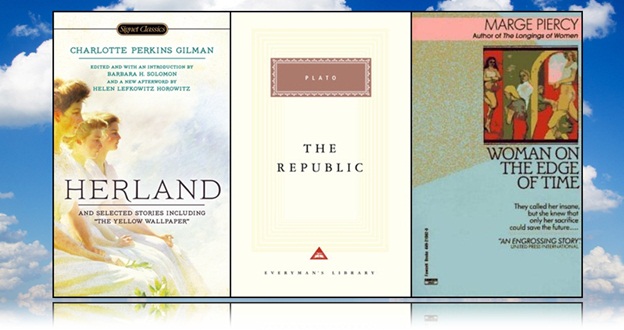 One of the most bizarre trends in contemporary cinema is the rise of the dystopian sci-fi flick. Sure, the “Hunger Games” films may be the most female-empowering YA franchise of all time. But anyone who reads the news already knows the world is in trouble. Do we really need a new movie every week to remind us of how dour our future may be? Frankly, it’s high time Hollywood made utopias instead. Here are some books that are ripe for adaptation.
One of the most bizarre trends in contemporary cinema is the rise of the dystopian sci-fi flick. Sure, the “Hunger Games” films may be the most female-empowering YA franchise of all time. But anyone who reads the news already knows the world is in trouble. Do we really need a new movie every week to remind us of how dour our future may be? Frankly, it’s high time Hollywood made utopias instead. Here are some books that are ripe for adaptation.
Herland
Though written in 1915, Charlotte Perkins Gilman’s gynocentric science fiction novel feels as radical now as when it was released. About an all-female world in which women have developed the ability to reproduce without men, it follows three male visitors as they struggle to adjust to an environment in which they’re not needed and in which traditional gender roles are nonexistent. Frankly, a modern adaptation of this book would blow everyone’s minds – so much so that it might require crowd-funding since it’s unlikely that a Hollywood studio would bankroll such subversion. But I smell “instant cult classic” if “Herland” were ever made, especially if a bad-ass feminist director with a subversive sense of humor – Rose Troche or Kathryn Bigelow, maybe – took the reins.
Plato’s Republic
Okay, at first glance, this seems like a stretch. But imagine if this Socratic dialogue about an ideal city run by “philosopher-kings” was intercut with a 2042 version of just this sort of city – complete with a perfect system of justice and democracy. Everyone loves a historical drama. Everyone loves a sci-fi movie. It’s the best sort of twofer, really. I’m thinking hot men in togas (Clooney as Socrates?) in the 300 BC segments, a glamorous world in the clouds for the future segments, and some smart, feeling philosopher type (Matt Damon?) who travels between the two. German director/writer Tom Tykwer (“Three,” “Perfume”) would be fabulous at the helm here. One important addition to Plato’s original screed: women. The Greeks weren’t exactly female-inclusive.
The Lathe of Heaven
Ursula K. Le Guin’s seminal 1971 novel is actually set in 2002 but the world it projects seems as out-of-reach now as when it was written. The premise: In the future (which is now our past!), most humans are so poor that they suffer from acute protein deprivation, and a giant war constantly wages in the Middle East. One man who’s done a ton of drugs – this was written in the psychedelic 1970s, after all – develops the ability to change reality through his dreams, and slowly a world unafflicted by classism, racism, overpopulation, poverty, sexism, and war comes into being. Imagine the trippy, doe-eyed movie that could spawn from this story (which we’d have to set in 2022, maybe). The Wachowski Siblings (“Cloud Atlas,” the “Matrix” movies) would do the trick nicely.
Woman on the Edge of Time
Written in 1976, Marge Piercy’s feminist utopia is astonishingly prescient. It follows Consuelo, a New York City welfare recipient who’s been institutionalized after attacking a pimp abusing her daughter. When she’s subjected to experimental brain surgery, Connie develops the ability to time travel, and she visits a 2137 in which all people can biologically nurse their children; gender, race, and corporations no longer exist; human reproduction now takes place in labs; and everyone thrives in small, Quaker-like communities. To date, this is one of the most radical sci-fis ever conceived; its rejection of biological determinism (and gendered pronouns!) dovetails nicely with today’s transgender movement. Obviously, this film also would have to live far outside the studio system. Cue another Kickstarter campaign, with brainy, bold “Another Earth” writer Brit Marling and her longtime collaborators Mike Cahill and Zal Batmanglij attached to the project from the get-go.
Ecotopia
No list of utopias would be complete without at least one environmentally focused addition, and Ernest Callenbach’s 1975 novel is widely acknowledged to have launched the “ecotopian fiction” genre. It’s set in a fictional country located in what was once the United States’ Pacific Northwest (where else?), and its central values entail renewable energy production, decentralized government, local entertainment rather than mass media, cannabis worship, and a wide range of gender roles and sexual practices. (Again, the 1970s.) Given that the terrifying reality of climate change has finally been accepted, this movie’s time has come. Hollywood eco-bigwigs like Mark Ruffalo, Leonardo DiCaprio, Cate Blanchett, Daryl Hannah, and Woody “Legalize It” Harrelson could both star and finance this baby.
This was originally published in Word and Film.
